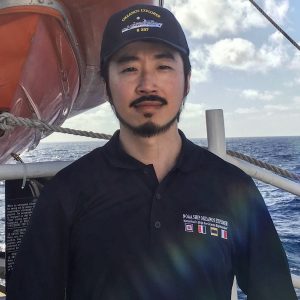
Liang Wu, PhD
Wu is a Postdoctoral Associate at the Department of Science and Technology Studies through the Southeast Asia Program at Cornell University. He is also a former Visiting Assistant Professor at Bates College, and Science Communication and Marine Policy Specialist at the National Oceanic and Atmospheric Administration (NOAA). His dissertation titled Containerization of Seafarers in the International Shipping Industry: Contemporary Seamanship, Maritime Social Infrastructures, and Mobility Politics of Global Logistics is supported by the 2021 Center for Engaged Scholarship Dissertation Fellowship.
Since 2006, through mixed methodologies led by ethnographic fieldwork and engagement at ports in Asia and the US, onboard, overseas, and online, Wu has been studying the lifeworlds and lifeways of seafarers – maritime workers delivering 90% of international trade who largely come from the Global South regions of Asia. His work delves into the techno-economic, infrastructural, legal, geographical, social, and environmental conditions and ramifications of container shipping in the postwar era, thereby unraveling the socio-technical, -political, and -natural relations generated by the global expedition of material goods and products, and systematic workings of commodity fetishism, racial capitalism, environmental extractivism, and neocolonial globalism of our times.
At Cornell, Wu is working on his publications including his book project about the sea and power – in its various senses from propulsion to organization, governance, and resilience. Wu specifically highlights Southeast Asian seafarers as the backbone of not only the international maritime workforce, but also the US and global economy and everyday lives in modern times. At the same time, Wu emphasizes that these overseas workers are navigating and bearing the brunt of climate change, geopolitical-economic currents, and industrial developments, including containerization in recent decades and the latest decarbonization endeavors of shipping known as “the 4th Propulsion Revolution”.
Overall, Wu’s industrial engagement and interdisciplinary research and teaching are bridging social oceanography, blue humanities, political economy, political ecology, and critical maritime, mobility, technology and labor, policy, globalization, and Anthropocene studies and advocacy. He seeks to understand the complex relationship between humanity and the oceans, and examine the intersection of translocal, transregional economy, society, and ecology of the sea beyond the maritime politics and dynamics of supply chain logistics. As an engaged scholar, Wu is actively involved in various organizations and working groups for the socially-just and sustainable development and future of oceanic communities and humanity.